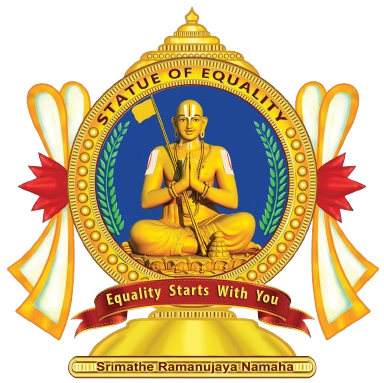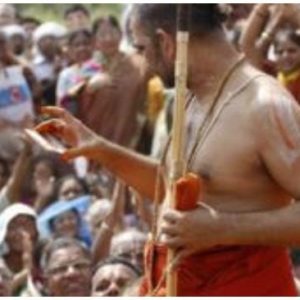As part of the continuing celebrations of the 1000th birth anniversary of Sri Ramanuja (1017 CE – 1137 CE), an international seminar on his philosophy, social reforms and contributions towards society was organised on 3rd, 4th 5th and 6th of August 2018. The purpose of the seminar was to discuss, enable people to take interest in, and understand the key message of Ramanujacharya – that all of humanity is equal, in the eyes of the Divine, and we all should live harmoniously serving God, and serving each other.
Almost 40 scholars from many parts of India, and 3 distinguished professors from the USA were invited to the seminar, and they all participated with great enthusiasm. Among the participants were 5 Vice chancellors or former Vice Chancellors of Universities/Institutions, 12 professors and heads of departments from various universities in India, more than a dozen traditional scholars, and many budding young scholars in Ramanujacharya ’s philosophy. 3 professors from the USA, including Francis Clooney, Parkman Professor of Divinity at Harvard University, Jon Paul Sydnor – Chairman of the Department of Theological studies at Emmanuel University, and Professor Gopal Gupta, Associate Professor at University of Evansville also participated and shared the depth of their knowledge about Bhagwad Ramanujacharya ’s contributions.
Various speakers talked about many topics, including
- The relevance of Ramanujacharya’s philosophy and teachings in today’s world – particularly in bringing about peace and harmony among all beings; in safeguarding the environment; and in bringing about equality among all human beings
- How Ramanujacharya’s philosophy appeals to the true seeker, regardless of the religious traditions they practice. 2 professors from USA, both of them ordained Christian priests/ministers, talked about how as seekers of truth, they learnt from, and appreciated various aspects of Ramanuja’s philosophy and traditions. They particularly emphasised the universal view point of Ramanujacharya that allows them to accept many of his teachings, and apply them and become better in their practice as Christians. As one professor mentioned “ Bhagwad Ramanujacharya ’s philosophy and what I learn from that allows me to become a better Christian”.
- Several technical topics were discussed at great length by great scholars, professors and budding students.

Hundreds of people observed and learnt from the proceedings, held under the auspices of Sri Sri Sri Tridandi Chinna Srimannarayana Ramanuja Jeeyar Swami, Sri Sri Sri Ahobila Ramanuja Jeeyar Swami, Sri Sri Sri Devanatha Ramanuja Jeeyar Swami and Sriman S.V. Ranga Ramanujacharyulu, Director of JIVA research and publications.
Several questions were raised by the audience and the scholars answered them and helped them learn and utilize Ramanuja’s philosophy to lead a more productive and peaceful life.
Here’s a reaction from a participant sent to our Co-ordinator, Sri Varadan ji,
- Dear Varadan,
I have boarded my return flight just now. I must compliment the entire team of organisers for the dedication and cheerful hospitality. It was THE BEST organised event I have ever attended, including the so many corporate professional events that I participated in. My humble pranamams to all of you. Certainly we are all blessed to have an exemplary leader like Chinna Jeeyar Swami!
Another reaction shared with Sriman Hariji –
- ‘When I step into this JIVA campus, I feel quality! It is beautiful to be here and attend the seminar. I would like to learn more every year by coming here and share a bigger part of the event next year!’– VP, Tech Mahindra
Detailed highlights of the program are below

The first day started with an inauguration ceremony,inaugural address and Mangalasanam by HH Chinna Jeeyar Swami. The distinguished invitees spoke about the relevance of Ramanujacharya’s contributions and how important this seminar is, to inculcate the study and practice of Ramanujacharya’s teachings. Professor Clooney particularly talked about how deeply relevant Ramanujacharya’s thought and message is in today’s world of chaos, and how the concepts and practice as taught by Ramanujacharya can be used to build a more harmonious and peaceful world.

The first session was a fantastic session, where Prof M.A. Laksmitatachar swami, founder director of Academy of Sanskrit Research in Melkote and winner of several government awards, talked about how Ramanujacharya’s teachings are also relevant for taking care of the environment, in addition to philosophy and spiritual advancement. He showed several examples as to how. Prof. M.A. Venkatakrishna, Former head of department of Vaishnavism in University of Madras talked eloquently about how Bhagavad Ramanujacharya ’s thoughts and reforms were appreciated by people from many walks of lives – including Swami Vivekannda, leaders of opposing philosophies, and even a very well known self-declared atheist poet in Tamilnadu Bharatidasan, who very proudly talked about how blessed TamilNadu is for being the birthplace of Ramanujacharya who brought the possibility of liberation and God to everyone regardless of caste and birth. In addition to these, there were scholarly discussions/presentations on the impact of the great Yamunacharya on Ramanuja’s thought and works – this was a treat to the interested students and scholars present.

The second session was a technical session, where deep discussions on various aspects of Ramanujacharya’s philosophy were discussed by eminent people, including Professor K E Devanathan, former Vice Chancellor of Sri Venkateswara Vedic University. Professor MA Alwar, professor of Sanskrit in Maharajah Sanskrit College in Mysore talked about how Ramanujacharya explained and synthesised the concept of Bhakti. It is relevant to note here that Bhagavad Ramanujacharya is the precursor of all bhakti movements across India. A budding Scholar, Sriman Ranganathan talked in depth about a deeply technical topic in this session.

The first day ended with a traditional sastra charcha in samskrit on a specific sentence in Chandogya Upanishad.
On 4th august, the first session had wonderful information to be shared. Sri Ayee Narasimhan talked about how Bhagavad Ramanujacharya was influenced by the great works of the Alwars while formalizing his philosophy and how he brought those to practice. Dr K. Anantha of Lal Bahadur Samskrit University, talked about the commentaries written on Sri Bhashya, the commentary written by Ramanuja on Vyasa’s Bramha Sutras. Professor Penna Madhushudhan eloquently talked about the influence of Ramanujacharya’s thought on Jnana Deva, or Jnaneswhar, a great saint of Maharashtra.
In the second session, Professor Jon Paul Sydnor, an ordained minister Of the Church, and a scholar in comparative religion, talked very eloquently about how God can be felt in one’s life in 6 ways, following Ramanujacharya’s philosophy and teachings. He also talked about how this is very similar to some of the teachings/practices he follows. This was a wonderful speech that emphasised on the commonality between all seekers of truth in various religious traditions, and how it is important for seeker to learn the best from other traditions. There was a speech on how God encompasses the entire Universe as we know, and in addition how he is beyond just the Universe. Another talk traced the influence of the work of Yamunacharya on one of Bhagavad Ramanujacharya’s earliest works.

Second session was headed by Sripada Subramanyam, a renowned scholar who talked in depth about a technical aspect. This session was mostly a technical session, and a brilliant young scholar, Sriman Manivannan captivated the audience and scholars through his wonderful mastery of a deeply complex work – in fact, the learned professors commented that his speech had so much depth that it could even be a thesis for an advanced degree.
The second day ended with a sastra charcha on a technical topic.

The first session of the third day was a fantasic session – Professor Francis Clooney of Harvard University eloquently talked about the Nitya grantha, a manual for daily worship, written by Ramanujacharya. He had translated it in English, and he talked about how this manual brings worship, ritual, meditation, surrender, community all together. Professor Clooney is a Catholic minister, and he talked about the commonalities between his mode of worship, and that present in the Nithya Grantha. In a Q&A session afterwards, he eloquently talked about how one should study other traditions, adopt whatever is acceptable to one’s own path, and respect whatever is different. These sessions also included a talk on the nature of Sri Vaikunta, or Paramapada by a couple of speakers. Professor Bhagavat Sharan Shukla beautifully pointed out the influence of Ramanujacharya and the similarities between the thoughts of various sampradayas like Madhvacharya sampradaya, Nimbarka Sampradaya, Ramananda Sapmradaya, Chaitanya Sampradaya, and others, with Ramanuja Sampradaya.
Second session on 5th august dealt with technical topics, elaborated beautifully by scholars.

The third session on 5<sup>th</sup> august dealt with a beautiful explanation of the place of the Universe we inhabit, in Ramanujacharya’s philosophy by Professor Gopal Gupta of University of Evansville in Indiana, USA. There was a specific speech on the relevance of Ramanujacharya’s philosophy in today’s world by (retd)Professor K Varadharajan, where he presented how Ramanuja’s teachings are relevant to harmony among all human beings, ecology, administration, politics etc. Professor Jaikant Singh Sharma talked about how Ramanujacharya influenced Ramananda, and there was another talk on the unique manipravala (2 language) tradition of Bhagavad Ramanujacharya.
– Research and Publications Team, JIVA asram!
Recommended Posts
Statue of Equality: A Divine and Serene Experience for Visitors
Funtime for Kids at Heart Statue of Equality
Funtime for Kids at Heart Statue of Equality
← Sri Swami Narayana (BAPS) Institution Head, Sriman Mahanth Swamy Visit to Statue of EqualityRamanujacharya’s Message at 305 ft High in London →

